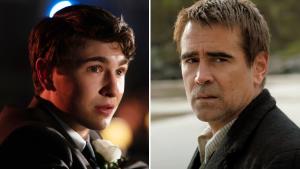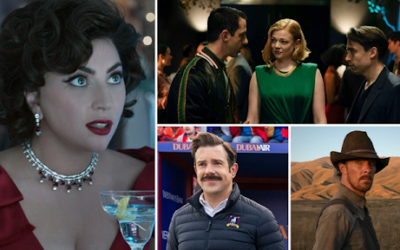Source: Variety
This year’s Golden Globe Awards ceremony certainly had a lot to contend with, not just the usual issues that tend to arise when putting together a major event dedicated to honoring the best films and television of the previous year, but also the great amount of controversy surrounding the very organization putting it all together. With this being the Golden Globes’ return to television after NBC refused to air the previous year’s ceremony, the result of accusations that the Hollywood Foreign Press Association (HFPA) had a significant lack of diversity within its membership, the event was seen by many as not merely a comeback, but an attempt to win back the approval of those who had become disillusioned with the Golden Globes. Host Jerrod Charmichael himself referenced the HPFA’s inclusivity issues during his opening monologue; “I’m here because I’m Black,” he joked. “I won’t say they [are] a racist organization… but they didn’t have a single Black member until George Floyd died, so do with that information what you will.”. There was also the matter of holding the event on Tuesday, January 10th, as opposed to the usual Sundays on which past Golden Globes took place, due to scheduling conflicts NBC had with Sunday Night Football and to avoid competition with the College Football Playoff National Championship game that took place the Monday before. Needless to say, there were plenty of challenges (some greater than others) the Golden Globes had to overcome in order to put on a halfway decent event, but in the end, that’s exactly what was achieved, and looking at the films and individuals who were honored throughout the evening, one might be able to get a solid sense of things to come.
With a total of three prizes earned before the end of the ceremony, the night’s biggest winner was “The Banshees of Inisherin”, a comedy-drama set in 1920s Ireland directed and written by Martin McDonagh. Not only was the film awarded with the Golden Globe for Best Motion Picture – Comedy or Musical, one of two Best Picture prizes given out by the Hollywood Foreign Press Association, but McDonagh received the prize for Best Screenplay, while leading actor Colin Farrell was named Best Actor in a Motion Picture – Comedy or Musical. The other Best Picture equivalent meanwhile, that being for Best Motion Picture – Drama, went to Steven Spielberg’s semi-autobiography “The Fabelmans”, a film that had also earned the director a Golden Globe for Best Director. Both these wins place “The Banshees of Inisherin” and “The Fabelmans” as major frontrunners for the Best Picture prize at the upcoming Academy Awards, but it should be noted that neither is a surefire winner as of yet. In fact, in the past decade, only three winners of Best Motion Picture – Drama (2013’s “12 Years a Slave”, 2016’s “Moonlight”, and 2020’s “Nomadland”) and one winner for Best Motion Picture – Musical or Comedy (2018’s “Green Book”) would eventually go on to take home the Oscar for Best Picture. In other words, the Golden Globes have not been an entirely reliable predictor as to what will win at the Academy Awards.
One film that could certainly triumph over “The Fabelmans” and “The Banshees of Inisherin” is one that has built an unusually strong momentum in the months since its release to theaters, a momentum that has only further strengthened with its own two Golden Globe wins that same night. That film is “Everything Everywhere All at Once”, written and directed by Daniel Kwan and Daniel Scheinert; despite being unable to receive the prizes for Best Director, Best Screenplay, and Best Motion Picture – Musical or Comedy as hoped, the film still found a way to not leave the ceremony empty-handed. Leading actress Michelle Yeoh found herself on stage at the ceremony after being named this year’s Best Actress in a Motion Picture – Musical or Comedy for her performance in the film, as did her costar Ke Huy Quan shortly after his name was read from the envelope that revealed the winner for Best Supporting Actor in a Motion Picture.
Both Yeoh and Quan are among the few actors of Asian descent to receive such major actor prizes, something that both actors acknowledged in their respective acceptance speeches. “All of you women understand this,” Yeoh stated as she reflected on how both racism and ageism served as major obstacles throughout her career. “As the days, the years and the numbers get bigger, it seems like opportunities start to get smaller as well”. Quan, meanwhile, looked back on his early years as a child actor in films like “The Goonies” and “Indiana Jones and the Temple of Doom” and how he struggled to get acting roles in his adulthood. “No matter what I did, I would never surpass what I achieved as a kid,” Quan stated. “Thankfully, more than 30 years later, two guys thought of me. [Directors Daniel Kwan and Daniel Scheinert] remembered that kid, and they gave me an opportunity to try again.”
Elsewhere in the acting categories, Cate Blanchett was named Best Actress in a Motion Picture – Drama for her performance in Todd Field’s “Tár”, while Austin Butler received the award for Best Actor in a Motion Picture – Drama for playing the titular character in Baz Luhrmann’s “Elvis”. Perhaps the biggest surprise of the evening though was the prize for Best Supporting Actress in a Motion Picture, given to Angela Bassett for her performance in “Black Panther: Wakanda Forever”. This marks the first instance that a Marvel Cinematic Universe film has received a Golden Globe for acting (in fact, it’s the first major award in general that an MCU film has received for acting), though Bassett’s primary concern was ensuring that her speech honored her “Black Panther” costar Chadwick Boseman, who passed away in 2020 before they could begin filming “Wakanda Forever” together.




